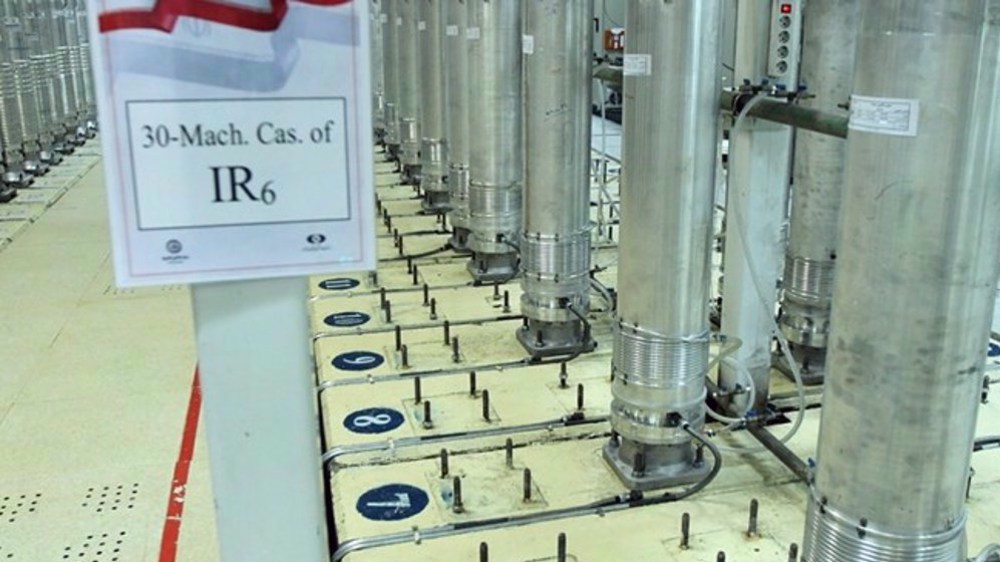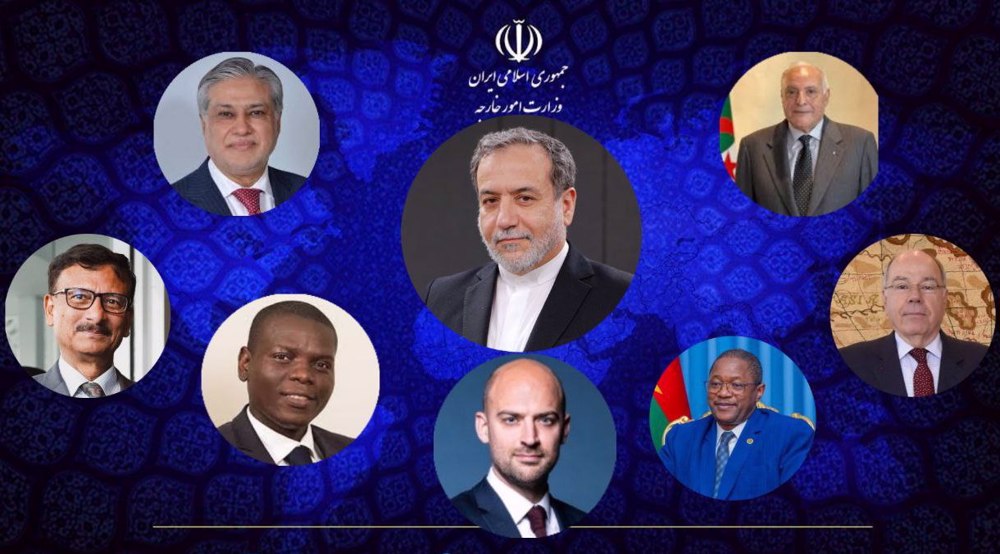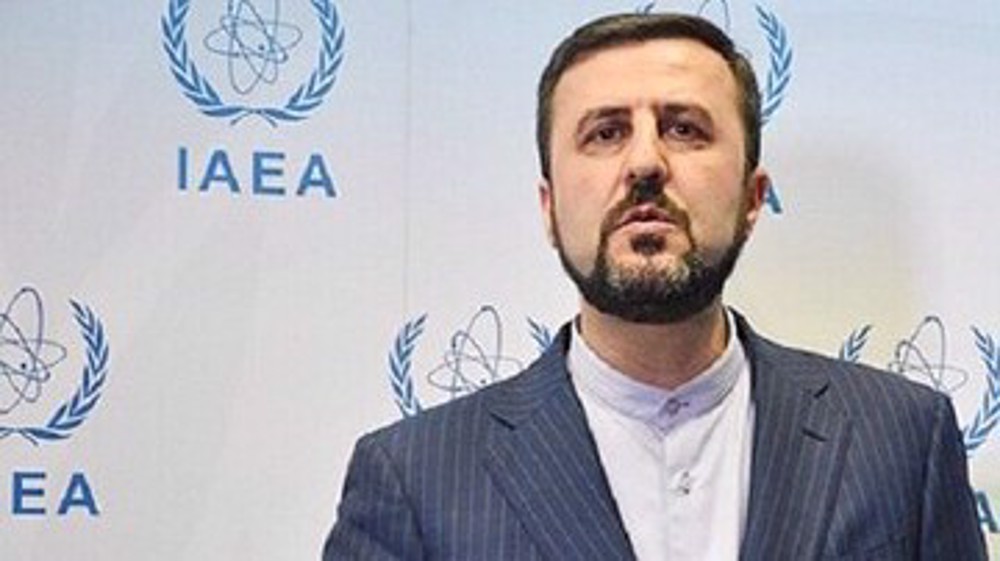IAEA chief: Nuclear inspections in Iran should not be used as 'bargaining chip'
The head of the International Atomic Energy Agency (IAEA) says the issue of nuclear inspections in Iran should not be used as a “bargaining chip” in any talks on the nuclear deal that Tehran clinched with six world powers in 2015.
Rafael Grossi made the remarks while speaking to reporters ahead of a meeting of the IAEA’s Board of Governors in Vienna on Monday, during which the world body was expected to discuss, among other things, Iran’s nuclear issue, including a new deal stuck between Tehran and the agency last month.
Under the deal, Iran will stop implementing the Additional Protocol to the nuclear Non-Proliferation Treaty (NPT) for a period of three months during which the IAEA’s inspectors’ access to the country’s nuclear facilities will be curtailed and made limited to those stipulated by the Safeguards Agreement.
"The inspection work of the IAEA must be preserved... (it) should not be put in the middle of a negotiating table as a bargaining chip," Grossi said.
The IAEA director general described the suspension of the agency’s inspections as a "huge loss," but when asked if the agency could still reassure the international community that the Iranian nuclear program was exclusively peaceful, he replied: "So far, so good," AFP reported.
He also noted that the agency will continue to have the means to verify the amount of uranium enriched by Iran.
Asked about the latest developments regarding Iran’s nuclear issue, Grossi said he did not want anything to jeopardize his inspectors' work in the Islamic Republic.
"What I hope is that the work of the agency will be preserved. This is essential," he was quoted by Reuters as saying.
In recent weeks, Tehran and Washington have been at loggerheads over which side should first return to compliance with the JCPOA, which former US president Donald Trump withdrew from in 2018.
Iran says the US should first lift all the sanctions put in place under the Trump administration before the Islamic Republic returns to full compliance. Tehran believes it was the White House that complicated the circumstances by the pullout, which in turn prompted Iran to take remedial measures.
However, as the US refrained from lifting sanctions before a deadline set by Tehran, Iran announced that the country stopped the voluntary implementation of the Additional Protocol that allowed the IAEA to carry out short-notice inspections of the country’s nuclear facilities.
The halt came under the Strategic Action Plan to Counter Sanctions, a law passed last December by the Iranian Parliament.
The legislation set February 23 as a deadline for the Iranian government to further scale back compliance with the 2015 nuclear deal, if the US does not lift its sanctions against the Islamic Republic.
The withdrawal from the Protocol adds to Iran’s previous steps away from the JCPOA in response to the US’s unilateral withdrawal in 2018 and the other parties’ failure to fulfill their commitments.
Deputy FM: Adoption of anti-Iran IAEA resolution threatens diplomacy
In a related development on Monday, Iran’s deputy foreign minister for political affairs, Abbas Araqchi, said any efforts made to get the IAEA adopt a resolution against Iran will be "unconstructive and threaten the current atmosphere created for the promotion of diplomacy."
Speaking in a video conference with his Austrian counterpart, Araqchi emphasized that total removal of unjust and illegal sanctions is the basic condition set by the Islamic Republic for returning to full implementation of its commitments under the JCPOA.
Russia: Anti-Iran resolution undermines Tehran-IAEA cooperation
Meanwhile, Russia warned on Monday that a resolution condemning Iran could hurt efforts to revive the JCPOA.
"Adoption of the resolution will not help the political process of returning to the normal comprehensive implementation of the JCPOA," Russia said in a note addressed to other member states of the IAEA.
The note added, "On the contrary it will hugely complicate those efforts undermining the prospects for the restoration of the JCPOA and for normal cooperation between Iran and the Agency."
Russia's ambassador to international organizations in Vienna, Mikhail Ulyanov, also took to Twitter on Monday, noting that such a move would be an "unfortunate miscalculation."
Sergei Ryabkov, Russia's deputy foreign minister, was also quoted by TASS news agency as saying, "There is no doubt that influential forces in Washington have taken steps in order to derail this meeting."
Such warnings by Russian officials came at a time that Britain, France and Germany – the three European signatories to the JCPOA – were pressing ahead with a US-backed plan for a resolution by the UN nuclear watchdog's Board criticizing Iran for curbing cooperation with the agency.
The three European parties to the JCPOA, circulated a draft resolution for the Vienna meeting voicing "serious concern" at Iran's reduction of transparency and urging Iran to reverse its steps.
The draft, sent to IAEA board members and obtained by Reuters, also voices disquiet at the "lack of progress" in obtaining explanations from Iran about uranium particles found at three old sites, including two that the IAEA first reported on last week.
China calls on US, Europe to refrain from taking confrontational actions
Meanwhile, Chinese Foreign Ministry Spokesperson Wang Wenbin on Monday called on the United States and Europe to refrain from taking confrontational actions against Iran at the IAEA, adding, "The Iranian nuclear issue is at a critical juncture."
"The top priority is for the United States to take specific measures to lift sanctions against Iran while Iran resumes compliance reciprocally in order to jointly push the JCPOA back on track," Wang said at his regular press conference.
He pointed to Beijing's proposal for an international conference in the presence of all remaining JCPOA parties plus the United States, adding that it supports the specific ideas put forward by the EU.
"China will continue to maintain contact with relevant parties and make joint efforts to this end," the spokesman said.
‘France working with parties to find solution to nuclear impasse’
In a related development, the French Foreign Ministry spokeswoman said on Monday that Paris continues to work with other JCPOA parties towards finding a solution to the “nuclear impasse” regarding the JCPOA.
Speaking in a daily briefing, Agnes von der Muhll added that France regretted Iran's refusal to take part in informal talks with world powers, including the United States, on possible ways to preserve the multilateral nuclear accord.
"We remain fully mobilized to work, with our (European) partners, the other participants in the JCPOA and the United States, on any negotiated solution that allows Iran to return to honoring its nuclear commitments and the United States to return to the 2015 agreement," the spokeswoman said.
VIDEO | Former FBI agent criticizes US Congress for 'outright corruption'
IRGC chief urges Muslim countries to cut aid routes to Israel
'New chapter in cooperation': Iran, Venezuela sign new MoUs
Jordan sentences former lawmaker for supporting Palestinian resistance
Basij volunteer forces hold massive drills in southwestern Iran
Israeli war criminals 'not welcome', US city says after ICC ruling
US vetoing of Gaza ceasefire resolution ‘disgraceful’: Iran’s UN envoy
VIDEO | IAEA adopts anti-Iran resolution tabled by E3











 This makes it easy to access the Press TV website
This makes it easy to access the Press TV website